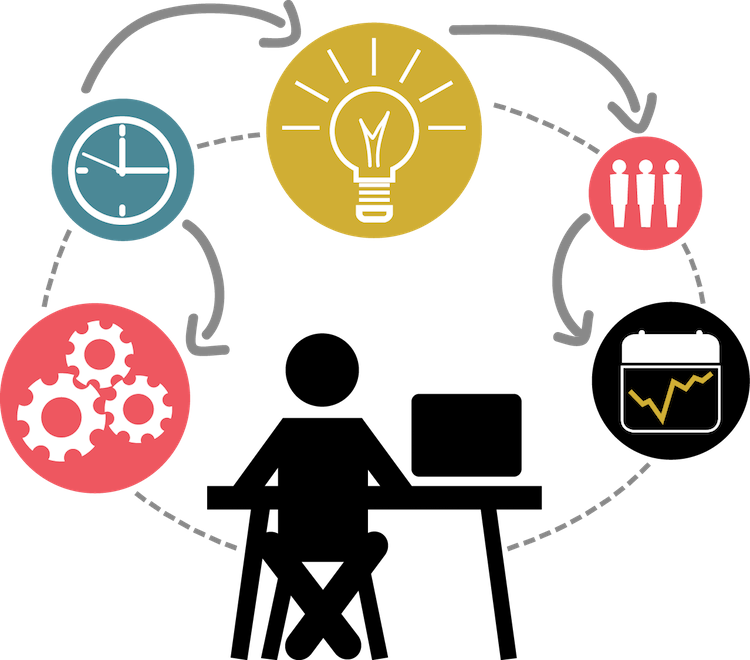Studying for the PMP® exam doesn’t need to be daunting—even the overall process is overwhelming and heavy tasks to accomplish. It’s not easy passing the PMP® exam, but with the right mindset and goal, you will get the hang of the whole thing before you know it.
The fifth part of the six-series PMP® exam preparation article covers how to prepare for the PMP® exam using certain guidelines or tips and tricks to help you be less stressed with the process of PMP® exam preparation. Gone are the days of cramming studies—leave those styles to high school and college kids.
Tips and Tricks : How to Prepare for the PMP® Exam In Just Four Easy Steps ?
If you are the type of person who tends to get to what he or she studied, don’t fret studying is not all about memorizing, but rather understanding things by heart. Understanding the information will embed more into your memory rather than going back and forth with the terminologies.
Some exam takers create their own keywords, key phrases or set acronyms that will help them understand the information better. However, not everyone is well-versed with this particular technique.
There is always a basic methodology and PMP® exams have one too, especially when it comes on an applicant way of preparation. And these methods are in a form of steps that will help you study efficiently without the cramping and headache.
Here are the following simple steps on how to prepare for the PMP® exam.

Step 1: Map it Out
Create a roadmap of what you are about to tackle before you start studying. Think of it as tracking a project—you have to run checks and reviews with your materials as well as information provided by your PMBoK® Guide and other study resources. This will make the following information more organized.
Step 2: Think About Your Motivation
That knowledge won’t go into your head and your PMP® exam preparation will simply be just a dust in the wind if you are not motivated enough to take the PMP® certification. Ask yourself what drives you to take this PMP® exam and what it really means to you and your career. Pinpointing a specific reason for taking the PMP® exam will help you see that reward clearly.
Step 3: Read and Inquire
Be an active reader by coming up with your own set of questions. Test yourself by plucking out information from your reading materials and create PMP® exam-related questions out from it. Keep reading. Enrich your mind with the constant flow of information.
Step 4: Learn to Break Down Your Timetable
Say you only have 6 hours to devote to your studies, but there are too many resources to cover and too many workshops to attend. Break these hours into smaller hours. For example, devote 3 hours with one reading material and 2 hours of the other, and so on. Managing your time as this point is essential since you need to acquire all the learning and review you need in preparation for the PMP® exam.
Tips and Tricks : How to Prepare for the PMP® Exam Via the PMBoK® Guide
So how to prepare for the PMP® exam when you have a lot of resources and almost pressed for time to study your PMBoK® Guide? The guide shouldn’t be intimidating—it should be an efficient assistant in your studies while preparing for your PMP® exam. However, some applicants are overwhelmed with the information overload so the get lost in the sea of time pressure.

Studying the PMBoK® Guide doesn’t have feel like climbing Mt. Everest. First off, study the guide every week. Study the same topic in your other resources. They might not be exactly the same, but at least you get to see all the angles from a different point of view. This will sharpen your comprehension skills.
Don’t underestimate the power of reading and understanding. If you continuously read the guide with intent concentration, you will likely absorb a lot of information. Rather than opting for memorization, you will likely remember what you’ve read while in the middle of the PMP® exam. Keep in mind that you also need to study the dynamics and disciplines of the PMBoK® Guide. This is very important since it will likely come out in the PMP® exam.
Don’t forget to track your progress so you won’t end up studying the same topic all over again.
Understanding is one of the main factors when studying for a PMP® exam. It doesn’t mean understanding the terminologies, but the significant components of PMP® and PMBoK® Guide as a whole. The next article (and the last one) will help you prepare for the PMP® exam, this time with sample or practice questions.
PMI, PMP and PMBoK are registered trademarks of the Project Management Institute, Inc.

